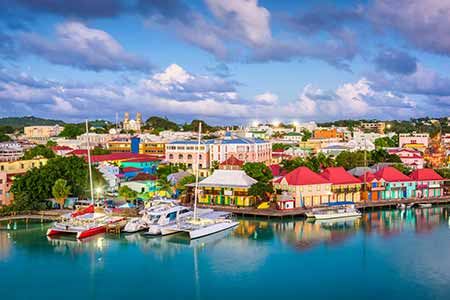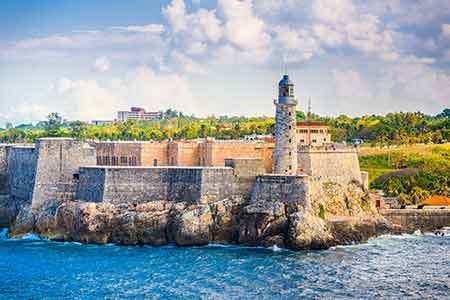You may think that moving to the Caribbean will allow you to enjoy a lot of sunshine, gorgeous sunsets, and miles of breathtaking beaches; but there's more to it. Before making the hasty decision to pack your bags and hop on a plane, you'll need to know if moving to the Caribbean is truly right for you. You'll also need to understand the pros and cons of moving to an island before you finalize your international move.

Read on to explore the factors that must be considered when moving to the Caribbean and find out the best places to live there.
Weather
Majority of the people move to the Caribbean to enjoy its endless summer. The temperature is usually around 82°F to 86°F (28°C to 30°C) during the day and around 77°F (25°C) at night. Although the weather is moderate and breezy throughout the year, it may get humid and sweaty during September and October.
Furthermore, tropical climates in the Caribbean islands can also cause destructive and dangerous storms. Upon moving to the Caribbean, be sure to take all the necessary precautions to prepare your home for hurricanes, tropical storms, monsoons, floods and other inclement weather conditions.
Exposure to creepy crawlies
When moving to the Caribbean, be prepared to deal with plenty of unpleasant creatures crawling about; cockroaches, spiders, tarantulas, mosquitoes, land crabs, and other icky pests that you may or may not be comfortable sharing your residence with. You might want to invest in a mosquito net for your bed to keep the uninvited guests from getting too comfy or close. Furthermore, the presence of mosquitoes also gives rise to the possibility of air borne diseases that are communicable and even deadly.
Cost of living
While many services in the islands are much cheaper than in the United States (such as transportation, gas and local produce) things like imported products are heavily taxed. Housing can be a little costly in certain areas, especially if you're to live in a secure, gated community. Since some islands have high rates of crime, many expats opt to live in these communities to ensure their safety and lower the possibility of break-ins.
On the other hand, many countries in the Caribbean are also considered tax havens (countries that levy certain taxes at a very low rate or not at all). These include Aruba, the Virgin Islands, St. Kitts and Nevis, Anguilla, Barbados, and Antigua and Barbuda. The islands without any income tax at all are the Bahamas and the Cayman Islands.
Crime rate
Due to high unemployment rates, poverty and narcotics trafficking, gang activity and violent crime have become commonplace in many Caribbean nations. The severity of high crime rates greatly varies depending on the island as well as the region of the island. As per the US Department of State, Barbados and Anguilla are among the safest islands while Jamaica has one of the highest crime rates. Of course, the part of the island you wish to relocate to also has a great influence on your safety. Even on the more dangerous islands the regions closest to the tourist areas and other hotspots are often relatively safe-though crimes such as pick-pocketing and theft can occur there.
Language
While English is spoken in many parts of the Caribbean, it is always helpful to at least try to learn the native tongue. Commonly spoken languages in the Caribbean include Spanish, English, French, Dutch, Haitian Creole and Papiamento, depending of course on the island. If you are relocating to a predominately expat community, learning the native language will be less important, but it will still certainly be useful.

Novelty vs. Reality
While many Americans dream of jumping on a plane to the Caribbean and leaving behind their dull, 9-5 routine, once they arrive in this foreign land, they'll begin to realize that life goes on just the same. Unless you are relocating for retirement, you will find that residing in the islands will not consist of lying on the beach and working on your tan all day. You will still have to find a job to make money and sustain your new lifestyle.
Amenities
The decision to move to the Caribbean requires serious thought and consideration before relocating. Everyday conveniences you are accustomed to, such as the nearby Wal-Mart or Starbucks, will not be very easy to come by in some of the islands. The cuisine will mostly consist of seafood and you should also expect the prices of food items to be high due to limited supply.
Day and night duration
Since the Caribbean region is closer to the equator, living here would mean you would be able to enjoy an equal duration of days and nights. Usually, in a Caribbean island, the sun rises at around 6 or 7 in the morning and sets exactly after 12 hours. So, if you hate the short days in the winters or the overly long ones in the summer, moving to the Caribbean is a wise choice.
Working in the caribbean
Since the entire Caribbean region is mainly popular for tourism, most of the jobs you'll find at the islands might be associated with restaurants and resorts. Other than that, some territories may prefer locales for recruitment. But since the cost of living is relatively less in the islands, you won't need as much money to manage your daily expenditure.

In order to get a job on an island, you'll need to make sure that you speak the native language. For example, to work in Aruba, you are required to be bilingual as most of the natives there speak Dutch. One great way to sustain your life while living at an island is to get a remote job like that of a blogger or graphic designer.
Retiring in the caribbean
While retiring in the Caribbean is a popular choice among to-be expats (owing to its pleasant weather and affordable lifestyle), one must also consider the unavoidable elements of living on an island. For example, it may not be easy to fly to other places because of limited flights.
Also, when you live in a small place, you may have to face the challenge of limited entertainment options. Apart from this, healthcare is a big concern when choosing a place to retire, especially for the expats who are not bilinguals. So, before you make your international move to spend your retired life in the Caribbean, ensure that the country has adequate facilities to cater to your needs.
Best places to live in caribbean
If you are wondering what the best Caribbean island to move to is, the answer depends on your criteria of research. Those with a fixed budget, can look for the cheapest places to live in the Caribbean. However, if your concern is safety and you prefer to reside in a gated community, your choices will be completely different.
For example, as per the International Living magazine, an expat couple can live a comfortable life in Ambergris Caye, the largest island in Belize for around $2,000 a month. On the other hand, Barbados will be a great choice for someone who is only fluent in English and has no financial constraints when residing in a high-end (and thus safe) gated community.
Here is a list of the best places to live in Caribbean:
In terms of safety:
- Barbados
- Anguilla
- St. Martin
- St. Barts
- The Virgin Islands
In terms of cost of living:
- Ambergris Caye, Belize
- Bocas Town, Panama
- Roatan, Honduras
- Isla Mujeres, Mexico
- Las Terrenas, Dominican Republic
Finding an International Mover
If you are planning for an international move to the Caribbean, make sure you have the proper documents and find trustworthy international movers for your relocation. To choose the best movers, you'll need to make sure that the moving company has all of the required licenses and is not a scam. You will be able to request for quotes from a bunch of companies after which you can choose the most suitable option for your international move.